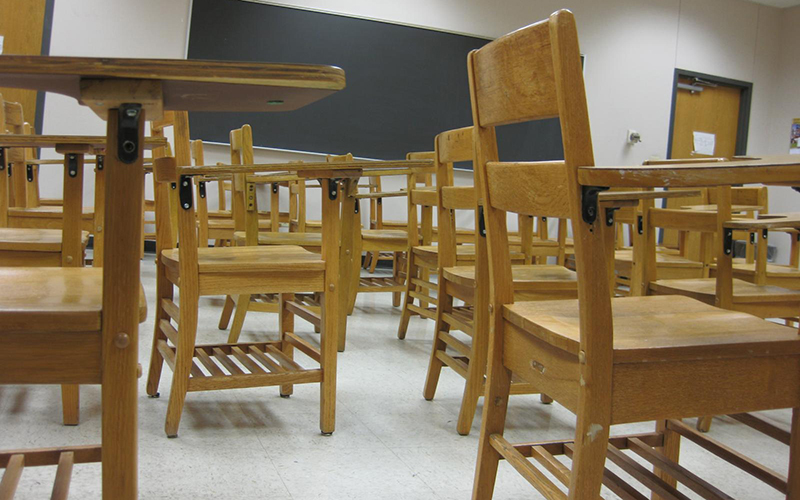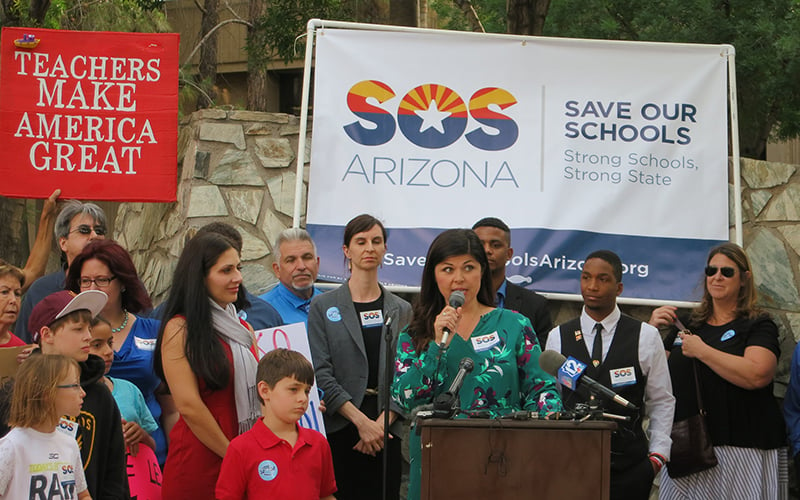WASHINGTON – When Arizona students return to school in August, a new law could make the state’s Empowerment Scholarship Accounts available to all 1.1 million of them. Unless a grassroots group of opponents has its way.
Save Our Schools Arizona has until Aug. 1 to collect the more than 75,000 signatures needed to petition SB 1431 to the 2018 ballot and put it on hold before it is scheduled to take effect Aug. 9.
The group claims there are not enough safeguards on the law and that it would siphon much-needed funds from public schools to serve students who may not need the financial help.
“Arizona’s public school system is already one of the worst funded…. It’s the least invested in in the entire country,” said Save Our Schools Arizona spokeswoman Dawn Penich Thacker. “We should not be funding and finding programs that take away even more from these starving schools that serve 95 percent of our kids.”
But the law’s supporters say the expansion of school choice it calls for would simply give power back to parents, and will put private schools within reach for students who could not otherwise afford them.
“It’s just about putting one more option on the table,” said Kim Martinez, the spokeswoman for the American Federation for Children. “This is just another option for them to access.”
SB 1431 would expand Arizona’s school voucher program, the Empowerment Scholarship Account, that takes the money that would be spent on a child’s public school and redirects it into an account the family can draw on to pay for a private or religious school.
The accounts were created in 2011 for students with disabilities and have gradually been expanded to include children on reservations, military kids, those who are wards of the state and those in failing schools, among other categories. The new law would expand it to all public school students, who would have to apply for inclusion, but it limits the number of students accepted to 0.5 percent of the total public school population per year before capping it in 2022.
The state is not yet accepting applications for the expanded program, but interested families can get on a list to be notified by the Department of Education when the application is available.
-Cronkite News video by Noelle D. Lilley
Arizona has been a leader in private school voucher programs, but other states have followed suit. Indiana has one of the nation’s largest school choice programs, the Indiana Choice Scholarship Program, in which eligibility is determined by income, so that low-income students benefit.
Critics note that there is no such limit on applications under the new Arizona program, where rolling applications are determined on a first-come, first-served basis, according to Arizona Department of Education officials.
“Arizona’s legislation has no income cap. So, to us if it was true that they wanted to help low-income families, they would’ve put an income cap,” Thacker said. “We see that year after year after year, that vouchers only help affluent families, primarily families in affluent parts of town like Scottsdale, North Phoenix and Paradise Valley.”
Martinez dismisses the suggestion that ESA takes money from the public school system, arguing that the money never belonged to the schools in the first place. Because the state allocates funding per student, not per school, she said, parents should be able to decide where that money is spent.
To Chris Perea, a teacher at Gateway Academy in Phoenix, the current ESA program has been life-saving for his students. He said most of them would not otherwise be able to afford to go to the school that specializes in children with Asperger’s syndrome and high-functioning autism.
“Our students start to blossom within weeks of getting to our school. Our students begin to love life again,” said Perea, a former public school teacher.
He said that nearly 80 percent of Gateway students are able to attend the school thanks to the ESA program.
“It’s allowing these students access to what’s best for them. It allows the parents to put them in schools that can specialize to meet the needs of their students,” he said.
Not all teachers are fans of an increase in private school vouchers, however.
Christina Marsh, the 2016 Arizona Educational Foundation Teacher of the Year, said vouchers “take money out of the general fund to subsidize more affluent students’ education, which places your more vulnerable populations at a disadvantage.”
Marsh, who plans to run for state Senate in 2018, said the state’s priorities are not in order when it comes to education.
“I’m mad and I’m sad. It doesn’t have to be this way,” Marsh said. “We do have the money, we are just not spending it where it needs to be spent. And the voucher program is just one more example of that.”

